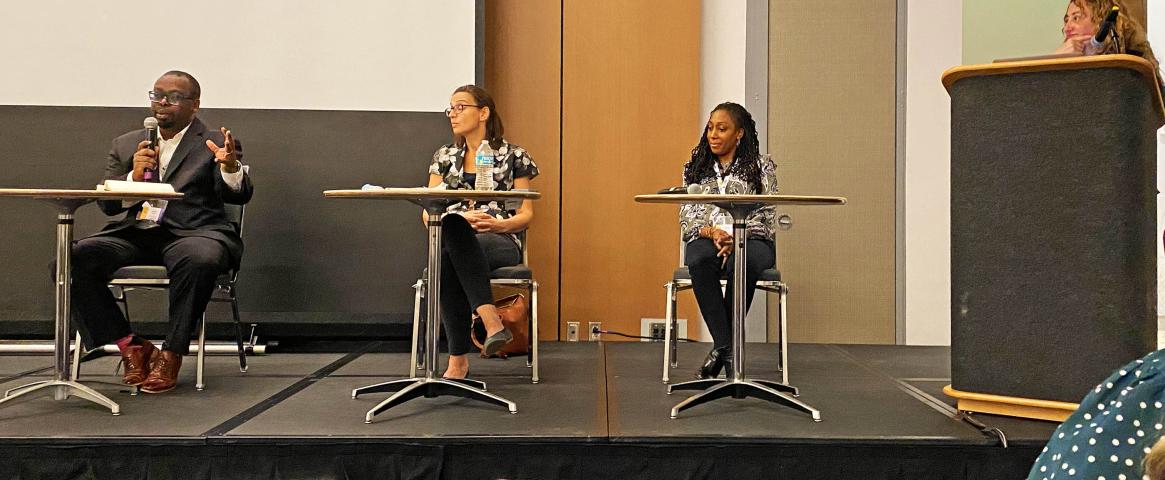Story by Wayne Pereanu
Photography by Zoe Grueskin
“Getting a book to be successful takes a well-oiled team: an agent, an editor, and a publicist,” said Lina Zeldovich, freelance journalist and author, and moderator of the ScienceWriters2022 session “How to Succeed as a Science Book Author From A to Z” presented on Oct. 23 in Memphis (#SciWriBooks).
Joining Zeldovich on the panel were Luba Ostashevsky, a Literary Agent at Ayesha Pande Literary; Jermey N. A. Matthews, Senior Acquisitions Editor at The MIT Press; and Lathea Mondesir, Associate Director of Publicity at Penguin Young Readers. Together they discussed the process of publishing a science book starting from finding an agent through the editing and marketing process, and beyond.
From an Idea to a Publishing House
Good job, you have a great idea for a book that you want to propose. But hold on a minute, according to Ostashevsky, “it’s a whole process to even get to a promising proposal.”
While you might find the concepts of fluid dynamics titillating, writing a book about science needs something more. Ostashevsky says that “science in and of itself is wonderful. But a general audience most of the time is not interested in an explainer. They are interested in hearing a story.” Finding the right structure or framework is pivotal to being able to capture an audience to share what you find interesting. That could mean framing the science in the form of a narrative, something like a memoir or historical anecdote, for example.
With a narrative-led science idea in hand, you’re ready to approach an editor at a publishing house.
Matthews said that “you don’t really need an agent to come to a university press.” But “editors are gatekeepers. You are trying to appeal to their subjective tastes” Ostashevsky advised. Having an agent can help with this process as they know who the editors are, their interests, and even what goes on in their lives.
The Editorial Process
As an author, having your book proposal at a publishing house can seem like a process shrouded in mystery. Matthews shed some light on what happens at the publishing house that will result in a decision to move forward with a proposal and the determination of a budget.
Matthews shared that the book proposals that come in are sent out for peer review. Then, a publishing committee will convene that can consist of publicists, editors, as well as marketing, sales, and production people. Together, they consider the peer-review notes as well as share their thoughts about the book proposal. Ultimately, they decide if they want to proceed with a book.
If a decision is made to proceed, a budget must then be set. Matthews revealed that the budget of a book depends primarily on three variables: the size of the potential market, the royalties that will be paid to the author, and the overall cost of the book.
Ostashevsky shared that authors (or their agents) need to be aware of the structure of the resulting contracts. She said that “publishing houses will try to push as many expenses on authors as possible.” Ostashevsky provided an example of publishing houses asking the author to pay for the production of the index against their royalties.
Marketing and Publicity
“You’ve written a book, and now here is where the work starts,” Mondesir said.
It’s not necessarily the case that the job of the author is done after finishing writing their book. Mondesir stressed the importance of building your platform. This can consist of having a blog, publishing in journals, building followers in social media, writing articles (with a byline), building relationships with other authors. She advised to tell people that you are writing a book and “give an opportunity to build resourceful relationships that people are going to help you talk about your book to their networks once it’s out.”
And while authors are expected to exercise their platform, publishers have some weapons at their disposal as well.
Mondesir mentions that a publicity campaign can include everything from creating a book trailer, a book website (separate from an author’s website), a book tour, as well as helping an author build a social media platform. She stresses that determining which elements will be part of a book campaign include considering the book’s budget as well as what they think they can get from the campaign, the return for investment. Mondesir states that if they think the book will be a best-seller, then they can plan out all the bells-and-whistles.
Wayne Pereanu (@pereanuw) is a Freelance science writer, editor, and programmer covering biochemistry and neuroscience.
Zoe Grueskin (@zoegrueling) is a graduate student at the CUNY Newmark Graduate School of Journalism and a freelance science writer working primarily in audio.
This ScienceWriters2022 conference coverage article was produced as part of the NASW Conference Support Grant awarded to Pereanu and Grueskin to attend the ScienceWriters2022 national conference. Find more 2022 conference coverage at www.nasw.org
A co-production of the National Association of Science Writers (NASW), the Council for the Advancement of Science Writing (CASW), and St. Jude Children's Research Hospital, the ScienceWriters2022 national conference featured an online portion Oct. 12-19, followed by an in-person portion held in Memphis, Tenn. Oct. 21-25. Learn more at www.sciencewriters2022.org and follow the conversation on Twitter at #SciWri22
Credits: Reporting by Wayne Pereanu; edited by Ben Young Landis. Photography by Zoe Grueskin; edited by Ben Young Landis




